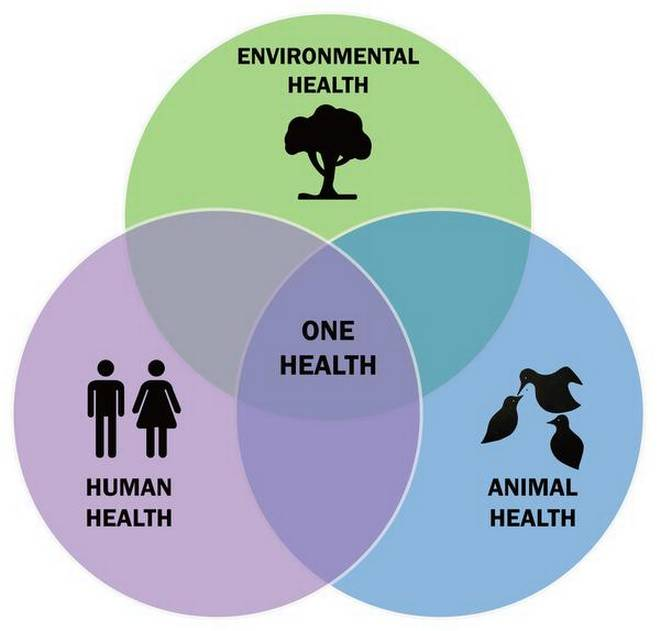Governance
One Health Consortium
- 18 Oct 2021
- 5 min read
Why in News
Recently, the Department of Biotechnology has launched the country’s first One Health consortium.
- The Department of Biotechnology is an Indian government department, under the Ministry of Science and Technology
Key Points
- About:
- This Consortium consisting of 27 organisations is one of the biggest one health programs launched by India in post-Covid times.
- It envisages carrying out surveillance of important bacterial, viral and parasitic infections of zoonotic and transboundary pathogens in India.
- It also looks into the use of existing diagnostic tests and the development of additional methodologies for the surveillance and understanding the spread of emerging diseases.
- Significance:
- It will provide a holistic approach to understand the health of human, animals and wildlife to minimise the damage caused by future pandemics.
- Related Government Steps:
- National Expert Group on ‘One Health:
- A National Expert Group on ‘One Health’ as a multi-sectoral, transdisciplinary, collaborative group was set up by India in May 2019.
- Recently in April 2021, the Group submitted its report with inclusion of Subject Specific Health Action Plans on identified Climate Sensitive Diseases and ‘One Health’.
- A National Expert Group on ‘One Health’ as a multi-sectoral, transdisciplinary, collaborative group was set up by India in May 2019.
- Malé Declaration in 2017:
- In the context of Green and Climate Resilient Healthcare Facilities, India became signatory to the Malé Declaration in 2017 and agreed to promote climate-resilient healthcare facilities to be able to withstand any climatic event.
- Universal Health Coverage:
- Its goal as stated in the UN Sustainable Development Goals (SDGs no. 3) is one of the most significant commitments to equitable quality healthcare for all.
- India moved a step closer towards its commitment to the SDGs, when in 2018 the country launched a national health protection scheme, Ayushman Bharat, to achieve UHC.
- Its goal as stated in the UN Sustainable Development Goals (SDGs no. 3) is one of the most significant commitments to equitable quality healthcare for all.
- National Expert Group on ‘One Health:
One Health Concept
- About:
- One Health is an approach that recognizes that the health of people is closely connected to the health of animals and our shared environment.
- One Health’ vision derives its blueprint from the agreement between the tripartite-plus alliance comprising the Food and Agriculture Organization of the United Nations (FAO), the World Organisation for Animal Health (OIE).
- It’s purpose is to encourage collaborations in research and sharing of knowledge at multiple levels across various disciplines like human health, animal health, plants, soil, environmental and ecosystem health in ways that improve, protect and defend the health of all species.
- Increasing Significance: It has become more important in recent years because many factors have changed interactions between people, animals, plants, and our environment.
- Human Expansion: Human populations are growing and expanding into new geographic areas due to which close contact with animals and their environments provides more opportunities for diseases to pass between animals and people.
- Of the contagious diseases affecting humans, more than 65% are of zoonotic or animal to man origin.
- Environmental Disruptions: Disruptions in environmental conditions and habitats can provide new opportunities for diseases to pass to animals.
- International Travel & Trade: The movement of people, animals, and animal products has increased from international travel and trade due to which diseases can spread quickly across borders and around the globe.
- Viruses in Wildlife: Scientists have observed that there are more than 1.7 million viruses circulating in wildlife, and many of them are likely to be zoonotic.
- This implies that unless there is timely detection, India risks facing many more pandemics in times to come.
- Human Expansion: Human populations are growing and expanding into new geographic areas due to which close contact with animals and their environments provides more opportunities for diseases to pass between animals and people.
Way Forward
- The Covid-19 pandemic showed the relevance of 'One Health' principles in the governance of infectious diseases, especially efforts to prevent and contain zoonotic diseases throughout the world.
- India needs to scale up such a model across the country and to establish meaningful research collaborations across the world.
- There is a need to develop best-practice guidelines for informal market and slaughterhouse operation (e.g., inspections, disease prevalence assessments), and creating mechanisms to operationalise ‘One Health’ at every stage down to the village level.
- Awareness generation, and increased investments toward meeting ‘One Health’ targets is the need of the hour.





